Fleurs du Mal Magazine


Or see the index
.jpg)
V i c t o r H u g o
(1802-1885)
Mes poèmes !
Mes poèmes ! soyez des fleuves !
Allez en vous élargissant !
Désaltérez dans les épreuves
Les coeurs saignants, les âmes veuves,
Celui qui monte ou qui descend.
Que l’aigle plonge, loin des fanges,
Son bec de lumière en vos eaux !
Et dans vos murmures étranges
Mêlez l’hymne de tous les anges
Aux chansons de tous les oiseaux !
.jpg)
Victor Hugo poetry
fleursdumal.nl magazine
More in: Archive G-H, Archive G-H, Hugo, Victor, Victor Hugo
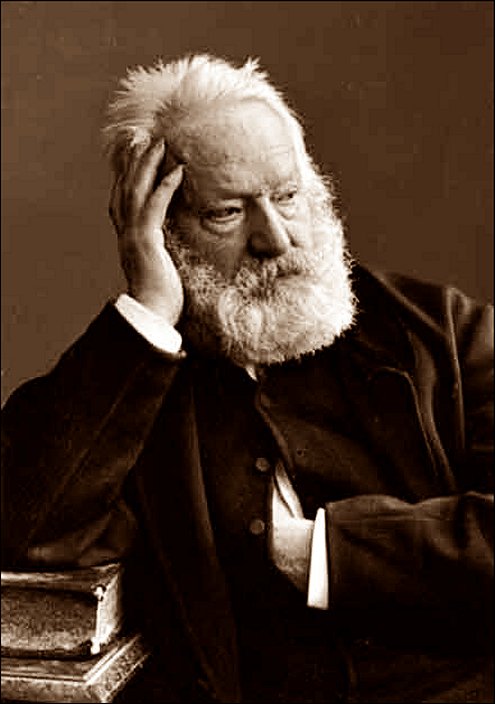
V i c t o r H u g o
(1802-1885)
L’art et le peuple
I
L’art, c’est la gloire et la joie.
Dans la tempête il flamboie ;
Il éclaire le ciel bleu.
L’art, splendeur universelle,
Au front du peuple étincelle,
Comme l’astre au front de Dieu.
L’art est un champ magnifique
Qui plaît au coeur pacifique,
Que la cité dit aux bois,
Que l’homme dit à la femme,
Que toutes les voix de l’âme
Chantent en choeur à la fois !
L’art, c’est la pensée humaine
Qui va brisant toute chaîne !
L’art, c’est le doux conquérant !
A lui le Rhin et le Tibre !
Peuple esclave, il te fait libre ;
Peuple libre, il te fait grand !
II
Ô bonne France invincible,
Chante ta chanson paisible !
Chante, et regarde le ciel !
Ta voix joyeuse et profonde
Est l’espérance du monde,
Ô grand peuple fraternel !
Bon peuple, chante à l’aurore,
Quand le soir vient, chante encore !
Le travail fait la gaîté.
Ris du vieux siècle qui passe !
Chante l’amour à voix basse,
Et tout haut la liberté !
Chante la sainte Italie,
La Pologne ensevelie,
Naples qu’un sang pur rougit,
La Hongrie agonisante …
Ô tyrans ! le peuple chante
Comme le lion rugit !
.jpg)
Victor Hugo poetry
fleursdumal.nl magazine
More in: Archive G-H, Archive G-H, Hugo, Victor, Victor Hugo
.jpg)
V i c t o r H u g o
(1802-1885)
Horror
Esprit mystérieux qui, le doigt sur ta bouche,
Passes… ne t’en va pas ! parle à l’homme farouche
Ivre d’ombre et d’immensité,
Parle-moi, toi, front blanc qui dans ma nuit te penches !
Réponds-moi, toi qui luis et marches sous les branches
Comme un souffle de la clarté !
Est-ce toi que chez moi minuit parfois apporte ?
Est-ce toi qui heurtais l’autre nuit à ma porte,
Pendant que je ne dormais pas ?
C’est donc vers moi que vient lentement ta lumière ?
La pierre de mon seuil peut-être est la première
Des sombres marches du trépas.
Peut-être qu’à ma porte ouvrant sur l’ombre immense,
L’invisible escalier des ténèbres commence ;
Peut-être, ô pâles échappés,
Quand vous montez du fond de l’horreur sépulcrale,
O morts, quand vous sortez de la froide spirale,
Est-ce chez moi que vous frappez !
Car la maison d’exil, mêlée aux catacombes,
Est adossée au mur de la ville des tombes.
Le proscrit est celui qui sort ;
Il flotte submergé comme la nef qui sombre.
Le jour le voit à peine et dit : Quelle est cette ombre ?
Et la nuit dit : Quel est ce mort ?
Sois la bienvenue, ombre ! ô ma soeur ! ô figure
Qui me fais signe alors que sur l’énigme obscure
Je me penche, sinistre et seul ;
Et qui viens, m’effrayant de ta lueur sublime,
Essuyer sur mon front la sueur de l’abîme
Avec un pan de ton linceul ! …
.jpg)
Victor Hugo poésie
fleursdumal.nl magazine
More in: Archive G-H, Archive G-H, Hugo, Victor, Victor Hugo

V i c t o r H u g o
(1802-1885)
Le crucifix
[…] La flagellation du Christ n’est pas finie.
Tout ce qu’il a souffert dans sa lente agonie,
Au mont des Oliviers et dans les carrefours,
Sous la croix, sur la croix, il le souffre toujours.
Après le Golgotha, Jésus, ouvrant son aile,
A beau s’être envolé dans l’aurore éternelle,
Il a beau resplendir, superbe et gracieux,
Dans la tranquillité sidérale des cieux,
Dans la gloire, parmi les archanges solaires,
Au-dessus des douleurs, au-dessus des colères,
Au-dessus du nuage âpre et confus des jours ;
Chaque fois que sur terre et dans nos temples sourds
Et dans nos vils palais, des docteurs et des scribes
Versent sur l’innocent leurs lâches diatribes,
Chaque fois que celui qui doit enseigner, ment,
Chaque fois que d’un traître il jaillit un serment,
Chaque fois que le juge, après une prière,
Jette au peuple ce mot : Justice ! et, par derrière,
Tend une main hideuse à l’or mystérieux,
Chaque fois que le prêtre, époussetant ses dieux,
Chante au crime hosanna, bat des mains aux désastres,
Et dit : gloire à César ! là-haut, parmi les astres,
Dans l’azur qu’aucun souffle orageux ne corrompt,
Christ frémissant essuie un crachat sur son front.
– Torquemada, j’entends le bruit de ta cognée ;
Tes bras sont nus, ta face est de sueur baignée ;
A quoi travailles-tu seul dans ton noir sentier ? –
Torquemada répond : – Je suis le charpentier
Et j’ai la hache au poing dans ce monde où nous sommes.
– Qu’est-ce donc que tu fais ? – Un bûcher pour les hommes.
– Avec quel bois ? – Avec la croix de Jésus-Christ. –
[…]
.jpg)
Victor Hugo poésie
fleursdumal.nl magazine
More in: Archive G-H, Archive G-H, Hugo, Victor, Victor Hugo
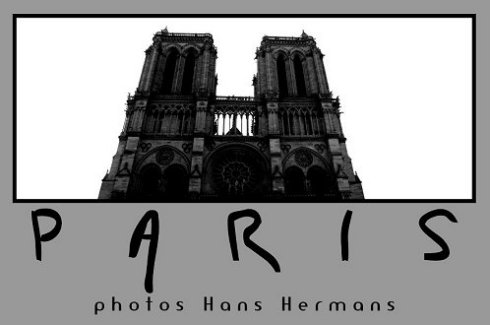
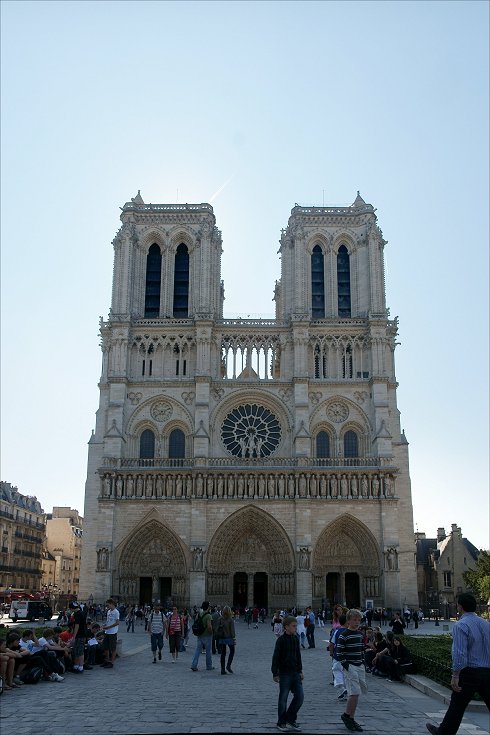
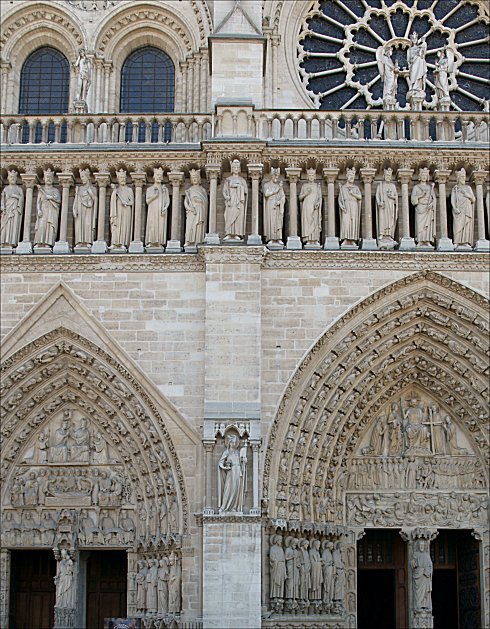
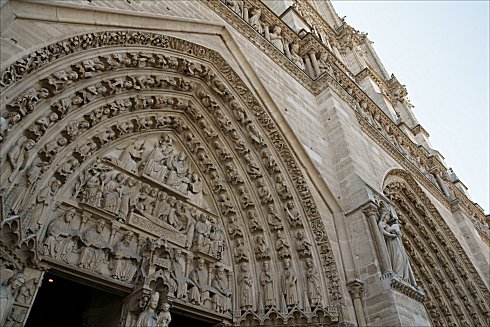
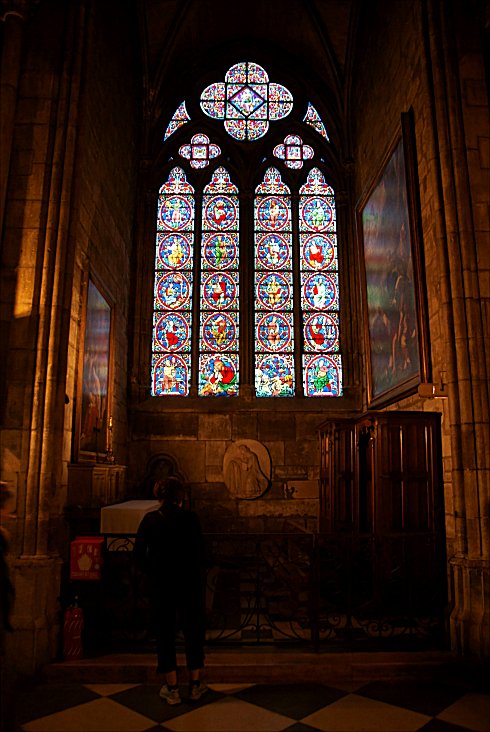
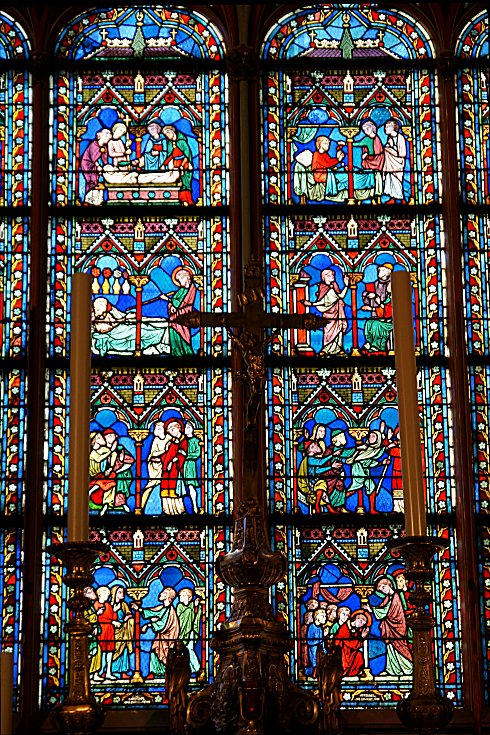
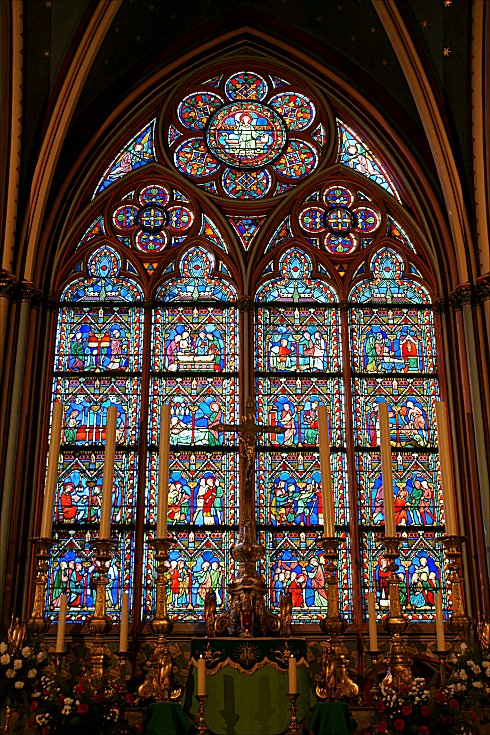

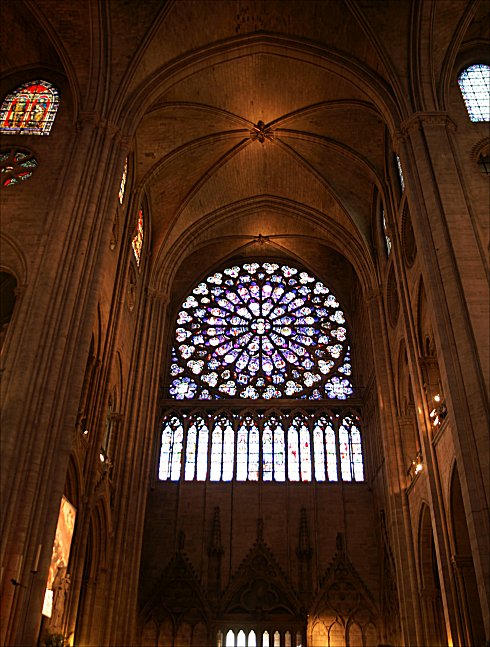
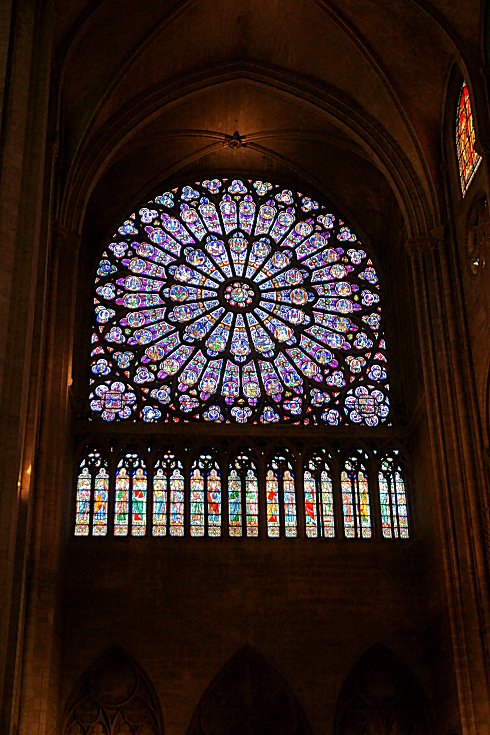
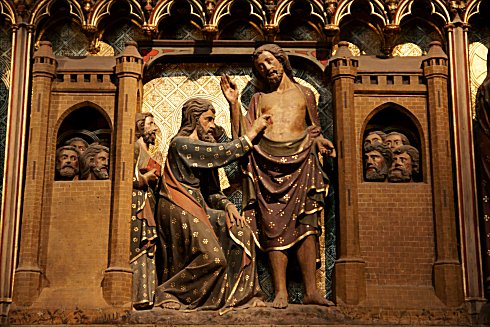
.jpg)
P h o t o s H a n s H e r m a n s
Cathédrale Notre Dame de Paris
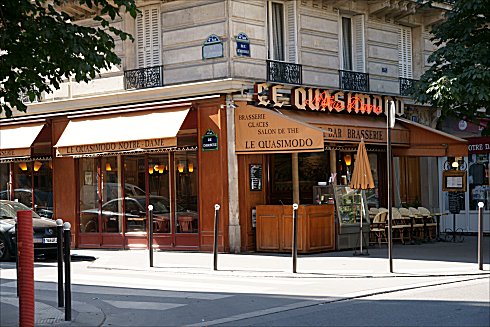
© hans hermans 2009
k e m p i s p o e t r y m a g a z i n e
More in: CATHEDRALS, FDM in Paris, Hans Hermans Photos, Victor Hugo

V i c t o r H u g o
(1802-1885)
Et Jeanne à Mariette a dit
Et Jeanne à Mariette a dit : – Je savais bien
Qu’en répondant : c’est moi, papa ne dirait rien.
Je n’ai pas peur de lui puisqu’il est mon grand-père.
Vois-tu, papa n’a pas le temps d’être en colère,
Il n’est jamais beaucoup fâché, parce qu’il faut
Qu’il regarde les fleurs, et quand il fait bien chaud
Il nous dit : N’allez pas au grand soleil nu-tête,
Et ne vous laissez pas piquer par une bête,
Courez, ne tirez pas le chien par son collier,
Prenez garde aux faux pas dans le grand escalier,
Et ne vous cognez pas contre les coins des marbres.
Jouez. Et puis après il s’en va dans les arbres.
.jpg)
Victor Hugo poésie
fleursdumal.nl magazine
More in: Archive G-H, Archive G-H, Hugo, Victor, Victor Hugo
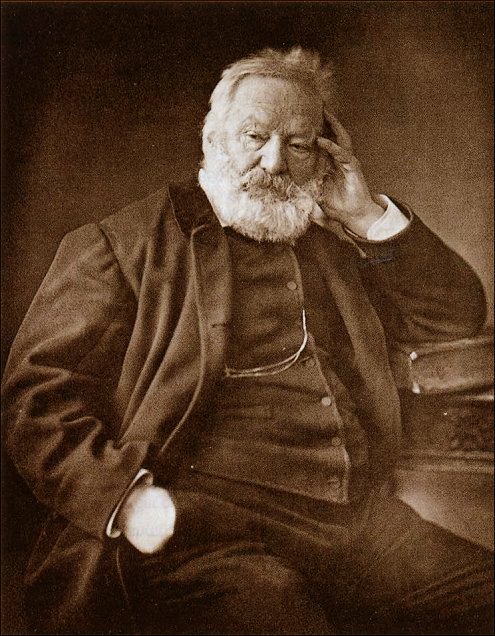
V i c t o r H u g o
(1802-1885)
Au peuple
Il te ressemble ; il est terrible et pacifique.
Il est sous l’infini le niveau magnifique ;
Il a le mouvement, il a l’immensité.
Apaisé d’un rayon et d’un souffle agité,
Tantôt c’est l’harmonie et tantôt le cri rauque.
Les monstres sont à l’aise en sa profondeur glauque ;
La trombe y germe ; il a des gouffres inconnus
D’où ceux qui l’ont bravé ne sont pas revenus ;
Sur son énormité le colosse chavire ;
Comme toi le despote il brise le navire ;
Le fanal est sur lui comme l’esprit sur toi ;
Il foudroie, il caresse, et Dieu seul sait pourquoi ;
Sa vague, où l’on entend comme des chocs d’armures,
Emplit la sombre nuit de monstrueux murmures,
Et l’on sent que ce flot, comme toi, gouffre humain,
Ayant rugi ce soir, dévorera demain.
Son onde est une lame aussi bien que le glaive ;
Il chante un hymne immense à Vénus qui se lève ;
Sa rondeur formidable, azur universel,
Accepte en son miroir tous les astres du ciel ;
Il a la force rude et la grâce superbe ;
Il déracine un roc, il épargne un brin d’herbe ;
Il jette comme toi l’écume aux fiers sommets,
Ô peuple ; seulement, lui, ne trompe jamais
Quand, l’oeil fixe, et debout sur sa grève sacrée,
Et pensif, on attend l’heure de sa marée.
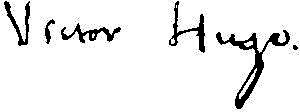
Victor Hugo poetry
fleursdumal.nl magazine
More in: Archive G-H, Archive G-H, Hugo, Victor, Victor Hugo

Victor Hugo
(1802-1885)
A un poète
Ami, cache ta vie et répands ton esprit.
Un tertre, où le gazon diversement fleurit ;
Des ravins où l’on voit grimper les chèvres blanches ;
Un vallon, abrité sous un réseau de branches
Pleines de nids d’oiseaux, de murmures, de voix,
Qu’un vent joyeux remue, et d’où tombe parfois,
Comme un sequin jeté par une main distraite,
Un rayon de soleil dans ton âme secrète ;
Quelques rocs, par Dieu même arrangés savamment
Pour faire des échos au fond du bois dormant ;
Voilà ce qu’il te faut pour séjour, pour demeure !
C’est là, – que ta maison chante, aime, rie ou pleure, –
Qu’il faut vivre, enfouir ton toit, borner tes jours,
Envoyant un soupir à peine aux antres sourds,
Mirant dans ta pensée intérieure et sombre
La vie obscure et douce et les heures sans nombre,
Bon d’ailleurs, et tournant, sans trouble ni remords,
Ton coeur vers les enfants, ton âme vers les morts !
Et puis, en même temps, au hasard, par le monde,
Suivant sa fantaisie auguste et vagabonde,
Loin de toi, par delà ton horizon vermeil,
Laisse ta poésie aller en plein soleil !
Dans les rauques cités, dans les champs taciturnes,
Effleurée en passant des lèvres et des urnes,
Laisse-la s’épancher, cristal jamais terni,
Et fuir, roulant toujours vers Dieu, gouffre infini,
Calme et pure, à travers les âmes fécondées,
Un immense courant de rêves et d’idées,
Qui recueille en passant, dans son flot solennel,
Toute eau qui sort de terre ou qui descend du ciel !
Toi, sois heureux dans l’ombre. En ta vie ignorée,
Dans ta tranquillité vénérable et sacrée,
Reste réfugié, penseur mystérieux !
Et que le voyageur malade et sérieux
Puisse, si le hasard l’amène en ta retraite,
Puiser en toi la paix, l’espérance discrète,
L’oubli de la fatigue et l’oubli du danger,
Et boire à ton esprit limpide, sans songer
Que, là-bas, tout un peuple aux mêmes eaux s’abreuve.
Sois petit comme source et sois grand comme fleuve.
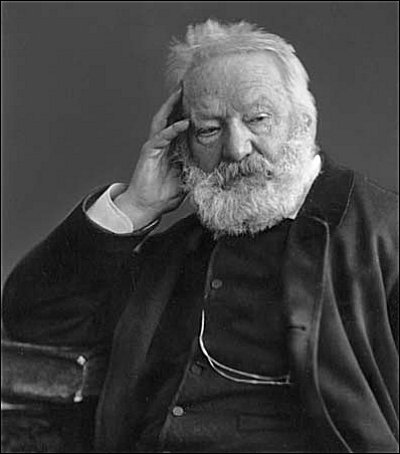

fleursdumal.nl magazine
More in: Archive G-H, Archive G-H, Hugo, Victor, Victor Hugo
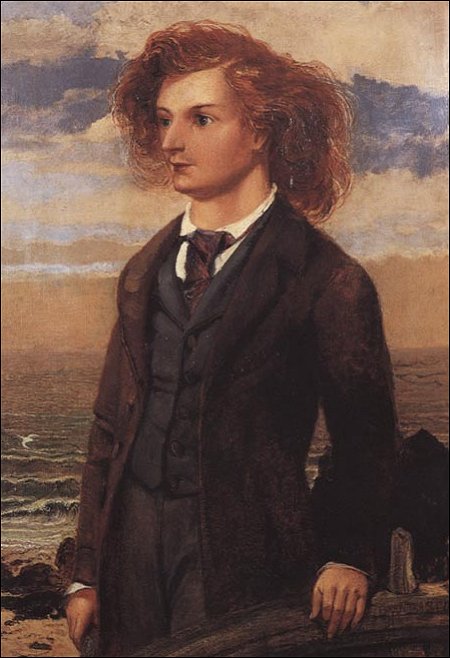
Algernon Charles Swinburne
(1837-1909)
A NEW-YEAR ODE
To Victor Hugo
I
Twice twelve times have the springs of years refilled
Their fountains from the river-head of time
Since by the green sea’s marge, ere autumn chilled
Waters and woods with sense of changing clime,
A great light rose upon my soul, and thrilled
My spirit of sense with sense of spheres in chime,
Sound as of song wherewith a God would build
Towers that no force of conquering war might climb.
Wind shook the glimmering sea
Even as my soul in me
Was stirred with breath of mastery more sublime,
Uplift and borne along
More thunderous tides of song,
Where wave rang back to wave more rapturous rhyme
And world on world flashed lordlier light
Than ever lit the wandering ways of ships by night.
II
The spirit of God, whose breath of life is song,
Moved, though his word was human, on the face
Of those deep waters of the soul, too long
Dumb, dark, and cold, that waited for the grace
Wherewith day kindles heaven: and as some throng
Of quiring wings fills full some lone chill place
With sudden rush of life and joy, more strong
Than death or sorrow or all night’s darkling race,
So was my heart, that heard
All heaven in each deep word,
Filled full with light of thought, and waxed apace
Itself more wide and deep,
To take that gift and keep
And cherish while my days fulfilled their space;
A record wide as earth and sea,
The Legend writ of Ages past and yet to be.
III
As high the chant of Paradise and Hell
Rose, when the soul of Milton gave it wings;
As wide the sweep of Shakespeare’s empire fell,
When life had bared for him her secret springs;
But not his various soul might range and dwell
Amid the mysteries of the founts of things;
Nor Milton’s range of rule so far might swell
Across the kingdoms of forgotten kings.
Men, centuries, nations, time,
Life, death, love, trust, and crime,
Rang record through the change of smitten strings
That felt an exile’s hand
Sound hope for every land
More loud than storm’s cloud-sundering trumpet rings,
And bid strong death for judgment rise,
And life bow down for judgment of his awless eyes.
IV
And death, soul-stricken in his strength, resigned
The keeping of the sepulchres to song;
And life was humbled, and his height of mind
Brought lower than lies a grave-stone fallen along;
And like a ghost and like a God mankind
Rose clad with light and darkness; weak and strong,
Clean and unclean, with eyes afire and blind,
Wounded and whole, fast bound with cord and thong,
Free; fair and foul, sin-stained,
And sinless; crowned and chained;
Fleet-limbed, and halting all his lifetime long;
Glad of deep shame, and sad
For shame’s sake; wise, and mad;
Girt round with love and hate of right and wrong;
Armed and disarmed for sleep and strife;
Proud, and sore fear made havoc of his pride of life.
V
Shadows and shapes of fable and storied sooth
Rose glorious as with gleam of gold unpriced;
Eve, clothed with heavenly nakedness and youth
That matched the morning’s; Cain, self-sacrificed
On crime’s first altar: legends wise as truth,
And truth in legends deep embalmed and spiced;
The stars that saw the starlike eyes of Ruth,
The grave that heard the clarion call of Christ.
And higher than sorrow and mirth
The heavenly song of earth
Sprang, in such notes as might have well sufficed
To still the storms of time
And sin’s contentious clime
With peace renewed of life reparadised:
Earth, scarred not yet with temporal scars;
Goddess of gods, our mother, chosen among the stars.
VI
Earth fair as heaven, ere change and time set odds
Between them, light and darkness know not when,
And fear, grown strong through panic periods,
Crouched, a crowned worm, in faith’s Lernean fen,
And love lay bound, and hope was scourged with rods,
And death cried out from desert and from den,
Seeing all the heaven above him dark with gods
And all the world about him marred of men.
Cities that nought might purge
Save the sea’s whelming surge
From all the pent pollutions in their pen
Deep death drank down, and wrought,
With wreck of all things, nought,
That none might live of all their names again,
Nor aught of all whose life is breath
Serve any God whose likeness was not like to death.
VII
Till by the lips and eyes of one live nation
The blind mute world found grace to see and speak,
And light watched rise a more divine creation
At that more godlike utterance of the Greek,
Let there be freedom. Kings whose orient station
Made pale the morn, and all her presage bleak,
Girt each with strengths of all his generation,
Dim tribes of shamefaced soul and sun-swart cheek,
Twice, urged with one desire,
Son following hard on sire,
With all the wrath of all a world to wreak,
And all the rage of night
Afire against the light
Whose weakness makes her strong-winged empire weak,
Stood up to unsay that saying, and fell
Too far for song, though song were thousand-tongued, to tell.
VIII
From those deep echoes of the loud Ægean
That rolled response whereat false fear was chid
By songs of joy sublime and Sophoclean,
Fresh notes reverberate westward rose to bid
All wearier times take comfort from the pæan
That tells the night what deeds the sunrise did,
Even till the lawns and torrents Pyrenean
Ring answer from the records of the Cid.
But never force of fountains
From sunniest hearts of mountains
Wherein the soul of hidden June was hid
Poured forth so pure and strong
Springs of reiterate song,
Loud as the streams his fame was reared amid,
More sweet than flowers they feed, and fair
With grace of lordlier sunshine and more lambent air.
IX
A star more prosperous than the storm-clothed east’s
Clothed all the warm south-west with light like spring’s,
When hands of strong men spread the wolves their feasts
And from snake-spirited princes plucked the stings;
Ere earth, grown all one den of hurtling beasts,
Had for her sunshine and her watersprings
The fire of hell that warmed the hearts of priests,
The wells of blood that slaked the lips of kings.
The shadow of night made stone
Stood populous and alone,
Dense with its dead and loathed of living things
That draw not life from death,
And as with hell’s own breath
And clangour of immitigable wings
Vexed the fair face of Paris, made
Foul in its murderous imminence of sound and shade.
X
And all these things were parcels of the vision
That moved a cloud before his eyes, or stood
A tower half shattered by the strong collision
Of spirit and spirit, of evil gods with good;
A ruinous wall rent through with grim division,
Where time had marked his every monstrous mood
Of scorn and strength and pride and self-derision:
The Tower of Things, that felt upon it brood
Night, and about it cast
The storm of all the past
Now mute and forceless as a fire subdued:
Yet through the rifted years
And centuries veiled with tears
And ages as with very death imbrued
Freedom, whence hope and faith grow strong,
Smiles, and firm love sustains the indissoluble song.
XI
Above the cloudy coil of days deceased,
Its might of flight, with mists and storms beset,
Burns heavenward, as with heart and hope increased,
For all the change of tempests, all the fret
Of frost or fire, keen fraud or force released,
Wherewith the world once wasted knows not yet
If evil or good lit all the darkling east
From the ardent moon of sovereign Mahomet.
Sublime in work and will
The song sublimer still
Salutes him, ere the splendour shrink and set;
Then with imperious eye
And wing that sounds the sky
Soars and sees risen as ghosts in concourse met
The old world’s seven elder wonders, firm
As dust and fixed as shadows, weaker than the worm.
XII
High witness borne of knights high-souled and hoary
Before death’s face and empire’s rings and glows
Even from the dust their life poured forth left gory,
As the eagle’s cry rings after from the snows
Supreme rebuke of shame clothed round with glory
And hosts whose track the false crowned eagle shows;
More loud than sounds through stormiest song and story
The laugh of slayers whose names the sea-wind knows;
More loud than peals on land
In many a red wet hand
The clash of gold and cymbals as they close;
Loud as the blast that meets
The might of marshalled fleets
And sheds it into shipwreck, like a rose
Blown from a child’s light grasp in sign
That earth’s high lords are lords not over breeze and brine.
XIII
Above the dust and mire of man’s dejection
The wide-winged spirit of song resurgent sees
His wingless and long-labouring resurrection
Up the arduous heaven, by sore and strange degrees
Mount, and with splendour of the soul’s reflection
Strike heaven’s dark sovereign down upon his knees,
Pale in the light of orient insurrection,
And dumb before the almightier lord’s decrees
Who bade him be of yore,
Who bids him be no more:
And all earth’s heart is quickened as the sea’s,
Even as when sunrise burns
The very sea’s heart yearns
That heard not on the midnight-walking breeze
The wail that woke with evensong
From hearts of poor folk watching all the darkness long.
XIV
Dawn and the beams of sunbright song illume
Love, with strange children at her piteous breast,
By grace of weakness from the grave-mouthed gloom
Plucked, and by mercy lulled to living rest,
Soft as the nursling’s nigh the grandsire’s tomb
That fell on sleep, a bird of rifled nest;
Soft as the lips whose smile unsaid the doom
That gave their sire to violent death’s arrest.
Even for such love’s sake strong,
Wrath fires the inveterate song
That bids hell gape for one whose bland mouth blest
All slayers and liars that sighed
Prayer as they slew and lied
Till blood had clothed his priesthood as a vest,
And hears, though darkness yet be dumb,
The silence of the trumpet of the wrath to come.
XV
Nor lacked these lights of constellated age
A star among them fed with life more dire,
Lit with his bloodied fame, whose withering rage
Made earth for heaven’s sake one funereal pyre
And life in faith’s name one appointed stage
For death to purge the souls of men with fire.
Heaven, earth, and hell on one thrice tragic page
Mixed all their light and darkness: one man’s lyre
Gave all their echoes voice;
Bade rose-cheeked love rejoice,
And cold-lipped craft with ravenous fear conspire,
And fire-eyed faith smite hope
Dead, seeing enthroned as Pope
And crowned of heaven on earth at hell’s desire
Sin, called by death’s incestuous name
Borgia: the world that heard it flushed and quailed with shame.
XVI
Another year, and hope triumphant heard
The consummating sound of song that spake
Conclusion to the multitudinous word
Whose expectation held her spirit awake
Till full delight for twice twelve years deferred
Bade all souls entering eat and drink, and take
A third time comfort given them, that the third
Might heap the measure up of twain, and make
The sinking year sublime
Among all sons of time
And fan in all men’s memories for his sake.
Each thought of ours became
Fire, kindling from his flame,
And music widening in his wide song’s wake.
Yea, and the world bore witness here
How great a light was risen upon this darkening year.
XVII
It was the dawn of winter: sword in sheath,
Change, veiled and mild, came down the gradual air
With cold slow smiles that hid the doom beneath.
Five days to die in yet were autumn’s, ere
The last leaf withered from his flowerless wreath.
South, east, and north, our skies were all blown bare,
But westward over glimmering holt and heath
Cloud, wind, and light had made a heaven more fair
Than ever dream or truth
Showed earth in time’s keen youth
When men with angels communed unaware.
Above the sun’s head, now
Veiled even to the ardent brow,
Rose two sheer wings of sundering cloud, that were
As a bird’s poised for vehement flight,
Full-fledged with plumes of tawny fire and hoar grey light.
XVIII
As midnight black, as twilight brown, they spread,
But feathered thick with flame that streaked and lined
Their living darkness, ominous else of dread,
From south to northmost verge of heaven inclined
Most like some giant angel’s, whose bent head
Bowed earthward, as with message for mankind
Of doom or benediction to be shed
From passage of his presence. Far behind,
Even while they seemed to close,
Stoop, and take flight, arose
Above them, higher than heavenliest thought may find
In light or night supreme
Of vision or of dream,
Immeasurable of men’s eyes or mounting mind,
Heaven, manifest in manifold
Light of pure pallid amber, cheered with fire of gold.
XIX
And where the fine gold faded all the sky
Shone green as the outer sea when April glows,
Inlaid with flakes and feathers fledged to fly
Of cloud suspense in rapture and repose,
With large live petals, broad as love bids lie
Full open when the sun salutes the rose,
And small rent sprays wherewith the heavens most high
Were strewn as autumn strews the garden-close
With ruinous roseleaves whirled
About their wan chill world,
Through wind-worn bowers that now no music knows,
Spoil of the dim dusk year
Whose utter night is near,
And near the flower of dawn beyond it blows;
Till east and west were fire and light,
As though the dawn to come had flushed the coming night.
XX
The highways paced of men that toil or play,
The byways known of none but lonely feet,
Were paven of purple woven of night and day
With hands that met as hands of friends might meet–
As though night’s were not lifted up to slay
And day’s had waxed not weaker. Peace more sweet
Than music, light more soft than shadow, lay
On downs and moorlands wan with day’s defeat,
That watched afar above
Life’s very rose of love
Let all its lustrous leaves fall, fade, and fleet,
And fill all heaven and earth
Full as with fires of birth
Whence time should feed his years with light and heat:
Nay, not life’s, but a flower more strong
Than life or time or death, love’s very rose of song.
XXI
Song visible, whence all men’s eyes were lit
With love and loving wonder: song that glowed
Through cloud and change on souls that knew not it
And hearts that wist not whence their comfort flowed,
Whence fear was lightened of her fever-fit,
Whence anguish of her life-compelling load.
Yea, no man’s head whereon the fire alit,
Of all that passed along that sunset road
Westward, no brow so drear,
No eye so dull of cheer,
No face so mean whereon that light abode,
But as with alien pride
Strange godhead glorified
Each feature flushed from heaven with fire that showed
The likeness of its own life wrought
By strong transfiguration as of living thought.
XXII
Nor only clouds of the everlasting sky,
Nor only men that paced that sunward way
To the utter bourne of evening, passed not by
Unblest or unillumined: none might say,
Of all things visible in the wide world’s eye,
That all too low for all that grace it lay:
The lowliest lakelets of the moorland nigh,
The narrowest pools where shallowest wavelets play,
Were filled from heaven above
With light like fire of love,
With flames and colours like a dawn in May,
As hearts that lowlier live
With light of thoughts that give
Light from the depth of souls more deep than they
Through song’s or story’s kindling scroll,
The splendour of the shadow that reveals the soul.
XXIII
For, when such light is in the world, we share,
All of us, all the rays thereof that shine:
Its presence is alive in the unseen air,
Its fire within our veins as quickening wine;
A spirit is shed on all men everywhere,
Known or not known of all men for divine.
Yea, as the sun makes heaven, that light makes fair
All souls of ours, all lesser souls than thine,
Priest, prophet, seer and sage,
Lord of a subject age
That bears thy seal upon it for a sign;
Whose name shall be thy name,
Whose light thy light of fame,
The light of love that makes thy soul a shrine;
Whose record through all years to be
Shall bear this witness written–that its womb bare thee.
XXIV
O mystery, whence to one man’s hand was given
Power upon all things of the spirit, and might
Whereby the veil of all the years was riven
And naked stood the secret soul of night!
O marvel, hailed of eyes whence cloud is driven,
That shows at last wrong reconciled with right
By death divine of evil and sin forgiven!
O light of song, whose fire is perfect light!
No speech, no voice, no thought,
No love, avails us aught
For service of thanksgiving in his sight
Who hath given us all for ever
Such gifts that man gave never
So many and great since first Time’s wings took flight.
Man may not praise a spirit above
Man’s: life and death shall praise him: we can only love.
XXV
Life, everlasting while the worlds endure,
Death, self-abased before a power more high,
Shall bear one witness, and their word stand sure,
That not till time be dead shall this man die
Love, like a bird, comes loyal to his lure;
Fame flies before him, wingless else to fly.
A child’s heart toward his kind is not more pure,
An eagle’s toward the sun no lordlier eye.
Awe sweet as love and proud
As fame, though hushed and bowed,
Yearns toward him silent as his face goes by:
All crowns before his crown
Triumphantly bow down,
For pride that one more great than all draws nigh:
All souls applaud, all hearts acclaim,
One heart benign, one soul supreme, one conquering name.
.jpg)
Algernon Charles Swinburne: A New-Year Ode to Victor Hugo
fleursdumal.nl magazine – magazine for art & literature
More in: Swinburne, Algernon Charles, Victor Hugo
Thank you for reading Fleurs du Mal - magazine for art & literature